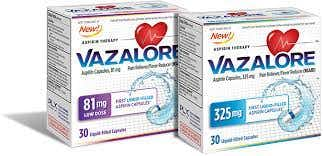
Aspirin can be hard on the digestive tract. Like other NSAIDs such as diclofenac, ibuprofen or naproxen, it may cause indigestion, ulceration, bleeding ulcers or even perforation of the lining of the stomach. That’s why we became interested in a new aspirin formation called Vazalore. It is a liquid-filled phospholipid-aspirin formulation that received FDA approvalin 2021.
Liquid Aspirin vs. Enteric-Coated Aspirin:
Q. I love the down-to-earth drug information in your columns, with the pros and cons of various medications. After reading about the “new” wonder drug, aspirin, I started taking an enteric-coated low-dose tablet a few times a week. My concerns are stroke and cancer, but I have a history of GERD (gastroesophageal reflux disease) and ulcers.
Recently I read that enteric-coated tablets could burn holes in my intestines. Not good! Is there any way to safely ingest aspirin and get the health benefits without suffering intestinal issues?
A. You are right that aspirin can be very irritating to the digestive tract. Ordinary aspirin tablets are notorious for causing stomach ulcers. Even enteric-coated tablets may damage the lining of the small intestines (International Journal of General Medicine, Aug. 24, 2021).
What About Vazalore to Protect the Stomach:
A reader recently took us to task about a drug called Vazalore:
Q. You wrote recently that enteric-coated aspirin could cause internal bleeding. Haven’t you heard of Vazalore? If so, why didn’t you mention it? As I understand it, this product eliminates the stomach irritation problem. Are you like my doctor—you never heard of it?
A. Many people believe that enteric-coated aspirin protects the digestive tract from damage. A systematic analysis of six randomized controlled trials involving more than 15,000 participants concluded, however, that coated aspirin doesn’t protect the GI tract (International Journal of General Medicine, Aug. 24, 2021).
Vazalore comes as a capsule containing a liquid formulation of aspirin and phospholipid. The FDA approved this combination in 2021. Because the phospholipid does not release the aspirin in an acidic environment like the stomach, it is supposed to cause less stomach irritation.
That said, we have not seen well-controlled studies proving that this formulation prevents ulceration or bleeding in the digestive tract. A review of aspirin and GI complications describes the systemic nature of aspirin’s activity (British Journal of Clinical Pharmacology, Nov. 2001). The authors point out that aspirin promotes bleeding throughout the body, including the digestive tract, by inhibiting protective compounds. Consequently, we do not know if Vazalore will prove safer for the digestive tract over the long term.
Vazalore Works Differently Than Enteric Coated Aspirin:
Vazalore provides a liquid inside a capsule that releases the aspirin in the small intestine. The aspirin is complexed with a phospholipid that hangs on to it so long as the environment is acidic—which the stomach is. Watch a video at this link. (It is presented by the manufacturer.)
Anyone taking a PPI (proton pump inhibitor) such as esomeprazole (Nexium), lansoprazole (Prevacid) or omeprazole (Prilosec) may need to avoid Vazalore since such drugs can raise the pH and might fool the pills. We could find no data about this interaction, so please ask your pharmacist or physician if a PPI would pose a problem.
This unique aspirin product is sold under the brand name Vazalore in both low dose (81 mg) and regular strength (325 mg) capsules. One study in the American Journal of Gastroenterology (Feb. 2011) suggests that this lipid-complex aspirin formulation may be less likely to damage the gastrointestinal tract. We await long-term studies on large numbers of volunteers.
A Poster Presentation Comparing Vazalore to Enteric Coated (EC) Aspirin
I stumbled across a poster presentation comparing Vazalore to enteric coated aspirin. It was offered at the Transcatheter Cardiovascular Therapeutics Meeting of the Cardiovascular Research Foundation in Orlando, Florida earlier this month. [search for poster TCT 320]
The 81 mg formulation was absorbed quite quickly. The aspirin got into the blood stream faster from this phospholipid liquid formulation than from the enteric-coated (EC) aspirin. What’s more, the anti-platelet aspirin activity was seen within an hour, whereas the EC-aspirin took a couple of hours to begin to have this anti-clotting effect.
Aspirin Caution:
Anyone contemplating long-term aspirin use should talk with a doctor about the pros and cons of aspirin.The US Preventive Services Task Force recently issued recommendations discouraging the routine use of aspirin to prevent initial heart attacks, strokes and cancer.
That said, secondary prevention remains a viable option. In other words, someone who has experienced a cardiovascular “accident” may well be a candidate for an effective aspirin product that might be less irritating to the GI tract. Here is a recent article we wrote that discusses the differences between primary and secondary prevention with aspirin.
What Is the Cost of Vazalore?
This new aspirin formulation costs more than “standard” aspirin. You can buy 200 tablets of Bayer aspirin (325 mg) for about $10. A box of 30 Vazalore aspirin capsules will run about $27.
If you buy a box of 81 mg of enteric-coated aspirin (Ecotrin) with 365 pills, you’ll pay around $16. A box of 30 Vazalore tablets (81 mg) would be about $15. Then again, some people may be willing to pay the extra for the liquid formulation if it is kinder to the stomach lining.
Want a way to create your own liquid aspirin? It will not work like the special phospholipid Vazalore formulation, but it will get aspirin into solution. Here is a link to a home remedy for making soluble aspirin.

